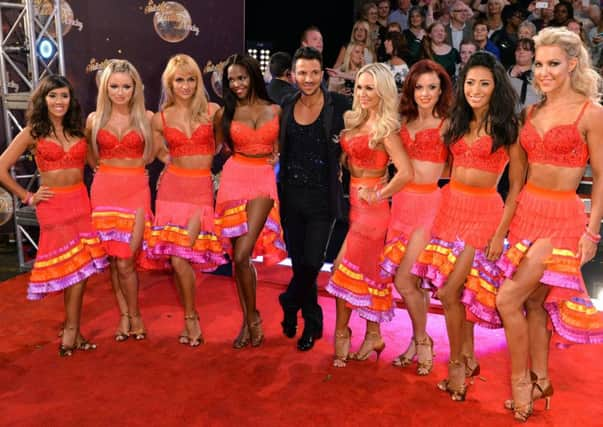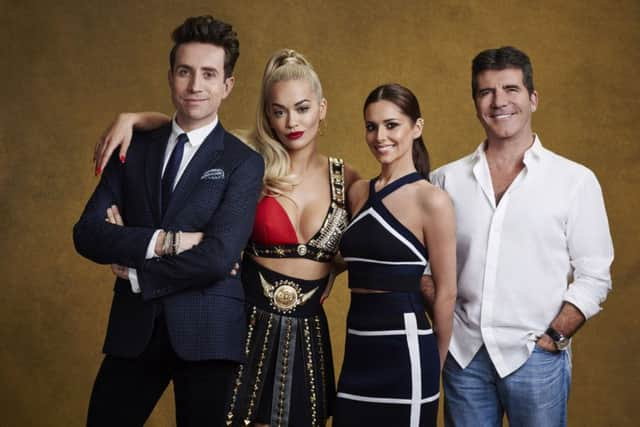Ashley Davies: Strictly’s the Olympics for some


Nearly everywhere you look right now Peter Andre’s perma-tanned face is grinning needily back at you. Usually this means he’s flogging yet another unaccountably popular aspect of his domestic life for people to gawp at while they recover from their lobotomies, but this time he’s about to embark on something that might just have me trying to remember what it feels like to take charge of the remote control.
That sequinned harbinger of autumn, Strictly Come Dancing, is back on the box this weekend, and if the past 11 years’ viewing figures are anything to go by, large swathes of the population will be captivated by the mirror-balled drama that waltzes us into winter with its fruity mocktail of glittery showbiz sweat, trails of chiffon and psychedelic camera work.
Advertisement
Hide AdAdvertisement
Hide AdI doubt whether the BBC execs knew what a massive success they’d have on their hands when they resuscitated aspects of Come Dancing and brought in an early Big Brother producer (back in the days when the then Channel 4 show was still fresh and surprising) to spike the format with an addictive substance that appeals to viewers’ appetite for competition, glamour and “real” drama. While the original Come Dancing reeked of the 1970s in a way that would never wash with today’s young viewers, Strictly managed to tick many of primetime telly’s zeitgeisty boxes, yet still retained a mild scent of the nylon age in order to appeal to Baby Boomers.


So, as well as having gorgeous, shiny young contestants, hot professional dancers and offering viewers the chance to influence the outcome (turning them into what the suits would call “stakeholders”), it retained the staples of comfy, traditional Saturday night BBC fare – the shiny floors, an in-house orchestra whose members look like actual session musicians rather than talent show contestants, the throwback host and a script bulging with innuendo.
It doesn’t hurt that the whole thing is a self-generating publicity machine, thanks to the romance that occasionally and unsurprisingly develops between dancers and celebs.
I think it’s encouraging for British society that Strictly’s audience is growing while the high-rating music-based talent shows are slowly losing their appeal. I’d like to think this is because viewers are realising that consuming bilge like X-Factor makes them participants in a cruel sport that humiliates the deluded, exploits the dreams and ambitions of naive people and spits them out when they are no longer a profitable product for the billionaire megalomaniacs in charge. (The falling ratings are probably more to do with fragmented patterns of media consumption in the digital age, but let me dream a little, will you, please?)
What makes Strictly worth watching for me is the fact that, like its “trying is good” stablemate, The Great British Bake Off, it generally rewards effort. It’s like the Olympics for people who don’t care about sport; like artistic performance for people who are not interested in culture.
Those dances are really difficult, and it takes a lot of practice to get them right, which is why I genuinely enjoy watching the progress of the contestants who come from a sporting background, even if they don’t always have the elegance or charm you want to see in a dancer: they know how much graft is required to get something right.
It also requires several levels of bravery. The most obvious involves the prospect of physical injuries. Some of those moves require huge leaps of faith, and perfecting them is a bruising, twisting, muscle-straining process. You have to be committed, and, as anyone who ever did ballet as a kid will know, dance teachers can be harsh task masters (read: utter bastards) at times.
Subjecting yourself to any kind of public vote also takes courage, particularly when the audience have a favourite and that favourite is not you. In one atrocious miscarriage of justice in series five, Penny Lancaster, a decent dancer who deserved to go further, was voted out simply because the punters preferred someone else’s personality.
Advertisement
Hide AdAdvertisement
Hide AdIt also takes guts to express yourself artistically, as there will always be someone willing to circulate a screen grab of your less-than-perfect “erotic” face while you mangle the tango. It’s not always wise to dance like no-one’s looking if your every move is being recorded. Remember poor, beautiful Nancy Dell’Olio in series nine? She may have felt amazing as she tore up the dance floor but a lot of the time it was like witnessing a glamorous seal being tossed about by a playful, peckish whale.
True, there’s a lot about Strictly that’s profoundly irritating. I generally record it so I can fast-forward the sometimes stilted chat, even though it has improved a great deal since the unfunny, over-rated Bruce Forsyth tap-danced into the sunset. And the “fun” filler packages usually have all the spontaneity of the awkward bits on A Question of Sport (you’d be forgiven for asking which awkward bits).
And the two-dimensional characters projected by some of the judges give me the yawns too. I don’t understand why in this day and age so many gay men on TV are only allowed to present one of a handful of personality “types” – in this case bitchy and judgmental or outrageous clowning flirtation that borders on sexual harassment. I think I’d prefer it if all the judges were proper dancers like the divine Darcey Bussell.
Part of me would also quite like it if they did away with some of the joke contestants, but I’m glad they won’t because watching (some of their) journeys reinforces what’s to be cherished about this show: that entrants have to make a serious effort, and along the way discover positive reserves in themselves. Regardless of how you feel about Ann Widdecombe’s politics, it’s hard not to believe that appearing on the show changed her life and her outlook. Who knows, we might even discover Peter Andre’s hidden depths.